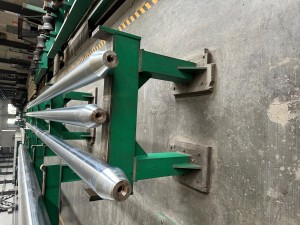Production technology
The production process of a mandrel bar consists of several complex and precise steps. The first is the material melting, which ensures the uniformity and purity of the core bar. Then forging, through the forging process, the grain of the material is refined, thereby improving its mechanical properties and service life. The forged mandrel requires heat treatment, a process that removes internal stress and increases the hardness and wear resistance of the mandrel. After that, machining, including turning, milling and other operations, makes the mandrel meet the design accuracy requirements. The last step is surface treatment, such as quenching, tempering, etc., to enhance the corrosion resistance and surface hardness of the mandrel.
Scope of application and specifications
Mandrel bar is widely used in various types of rolling mills, such as MPM (multi-pass rolling mill), PQF (high precision rolling mill) and FQM (fast rolling mill). Its variety of specifications, ranging from Φ80 mm to 500 mm in diameter, length from 2500 mm to 17,500 mm, can meet different production needs.
Material selection
The material of the mandrel bar is usually AISI H13 or the national standard 4Cr5MoSiV1 and 36CrNiMoV6. These materials have excellent high temperature properties and mechanical strength to maintain stability in high temperature and high pressure environments. The non-metallic inclusions in the mandrel material are required to be no more than 1.0 grade A, B, C and D, and the grain size should reach 8 grade or above. These stringent material requirements ensure the high quality and reliability of the mandrel bar.
Mechanical property
The recommended mechanical properties of the mandrel bar of H13 material are as follows: For the mandrel with diameter ≤200 mm, the tensile strength is 1127-1274 mpa, the yield strength is ≥931MPa, the elongation is ≥8%, the section shrinkage is ≥25%, the impact work is ≥20J, and the hardness is HB350-390; For mandrel with diameter >200 mm, its tensile strength is 1078-1274 mpa, yield strength is ≥882MPa, elongation is ≥8%, section shrinkage is ≥25%, impact work is ≥20J, hardness is HB330-375.
As always, we sincerely appreciate your support and business. Please do not hesitate to contact ssophie@welongchina.com if you have any questions or concerns. We look forward to continuing our partnership with you.
Post time: Jun-19-2024





